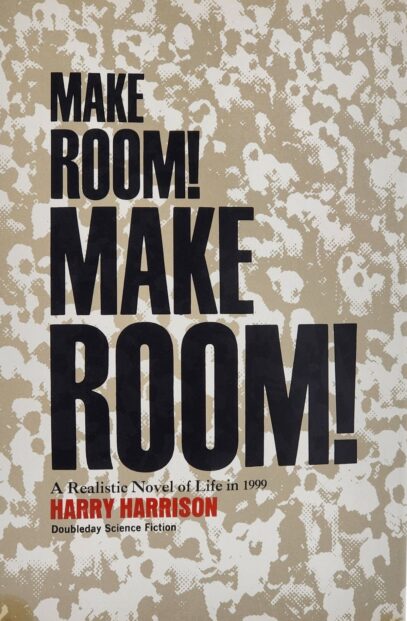 By HARRY HARRISON (Doubleday; 1966/67)
By HARRY HARRISON (Doubleday; 1966/67)
A moldy oldie from the 1960s science fiction market (and the basis for the 1973 film SOYLENT GREEN). The author was Harry Harrison (1925-2012), known for the pulpy and satiric DEATHWORLD, STAINLESS STEEL RAT and BILL THE GALACTIC HERO book series. Here he offered a straightforward, non-ironic dystopian narrative with a stern message about the dangers of overpopulation. MAKE ROOM! MAKE ROOM! was well received in its day, and is considered a classic by many, but upon reading it fifty plus years later my inescapable conclusion is that, simply, time has passed it by.
The setting is New York City in the far-off year 1999. Overcrowding is the major problem, with the US population topping 344 million people (not too far, FYI, from our current 331.9 million count), 35 million of whom reside in NYC. The wealthy are ensconced in luxury apartments while everyone else is forced to share space, if they’re even lucky enough to have a place to live, with food and water strictly rationed. The plot, such as it is, involves the murder of a prominent gangster, which sets off an investigation that comes to involve both the police and the mob.
Harrison was evidently determined to deflate the pulp conventions with which he built his reputation. There’s no mystery about the killing that drives the novel, as we learn early on that it was committed by Billy, a Chinese messenger boy, purely by accident. A romance develops between Andy, the detective assigned to the case, and Shiri, the murdered man’s sultry mistress, but it goes nowhere, as the flighty Shiri eventually grows bored and moves on to a wealthier man. As for the apocalyptic air that pervades the novel, it likewise fizzles (SOYLENT GREEN’s famous shock ending is nowhere to be found in these pages), with the country continuing on its way after the dawn of the new millennium, inspiring a character to ask “Can this world go on for another thousand years, like this? LIKE THIS?”
Such a commitment to unvarnished realism is laudable, but it doesn’t make for a very exciting reading experience. Perhaps the major problem is that for all his attempts to defy convention, Harrison nonetheless employs a number of sixties-era genre clichés. Foremost among those clichés is a know-it-all old guy character (a favorite device of the late Robert Heinlein) in the form of Andy’s retired roommate Sol, who repeatedly voices the novel’s message in a succession of lengthy speeches about the dangers of overpopulation and how great things used to be. It’s ironic that this once highly topical novel is itself now a thing of the past, and, frankly, better left there.
